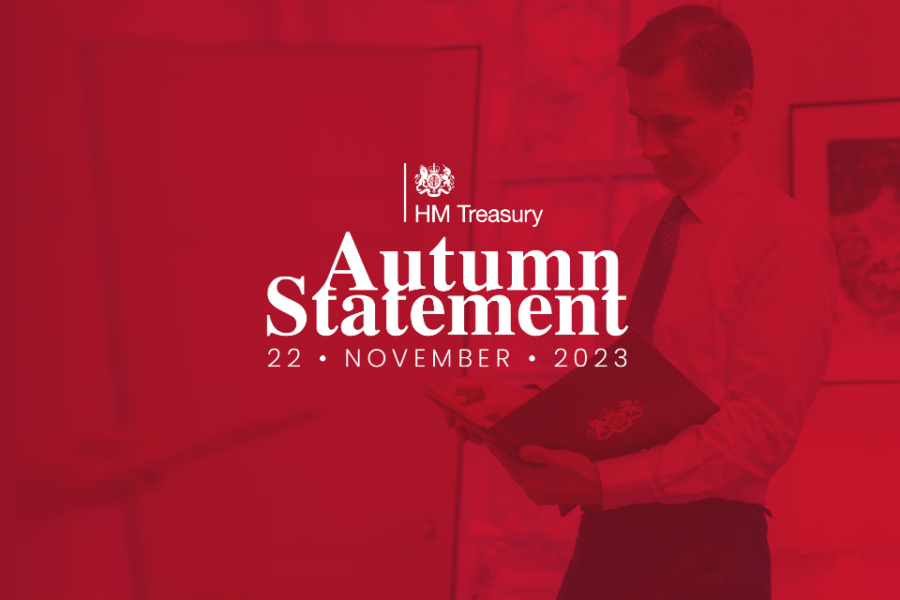Autumn Statement key takeaways for SMEs

Aimed at building a stronger and more resilient economy, the UK Government set out a plan to unlock growth and productivity in the Autumn Statement for Growth, backing British Business.
Including the biggest permanent tax cut in modern British history for businesses, the Autumn Statement gets the economy growing, debt falling, and helps return inflation to its 2% target.
Investment
Permanent Full Expensing – giving businesses the certainty to confidently invest for less. A company can now permanently claim 100% capital allowances on qualifying main rate plant and machinery investments, meaning that for every pound invested its taxes are cut by up to 25p. Worth £10 billion a year, full expensing is the biggest business tax cut in modern British history
Business Rates Support Package
A business rates support package worth £4.3 billion over the next 5 years will help high streets and protect those small businesses that are the backbones of communities. This includes a rollover of 75% Retail, Hospitality and Leisure relief for 230,000 properties and a freeze to the small business multiplier, which will protect around 90% of ratepayers.
The Climate Change Agreement Scheme will be extended, giving energy intensive businesses like steel, ceramics and breweries around £300 million tax relief every year until 2033 to encourage investment in energy efficiency and support the Net Zero transition.
SME Support
The Autumn Statement sets out a package of measures that will support SME leaders to acquire the vital skills and opportunities they need to increase productivity and grow their businesses. This includes: access to growth funding through extension of Future Fund: Breakthrough; access to management training through leading business schools with extension of the Help to Grow scheme; and intensive support to help manufacturing SMEs adopt advanced digital technologies through the expansion of Made Smarter.
SMEs will be supported with tougher regulation on late payers and Smarter Regulation on improving price transparency for consumers.
The rate at which loss-making companies are taxed within the merged scheme will be reduced from 25% to 19%, and the threshold for additional support for R&D intensive loss-making SMEs will be lowered to 30%, benefiting a further 5,000 SMEs.
The existing R&D Expenditure Credit and Small and Medium Enterprise Scheme will be merged from April 2024, simplifying the system and boosting innovation in the UK.
Sector Support
£4.5 billion has been given to strategic manufacturing sectors including £960 million earmarked for clean energy and a further £10 billion-a-year tax break for companies that invest in equipment and technology.
More than £2 billion over the next five years earmarked for the automotive industry via the Advanced Manufacturing Plan. The funding will support the UK’s manufacturing sector, supply chain and development of zero emission vehicles and will oversee £975 million of funding to support Airbus and Rolls-Royce develop technologies for the next generation of aircraft and engines.
Further information, including on the application processes, will be made available by the government in due course.
The manufacturing sub-sectors that will be able to apply for funding include:
- Automotive
- Aerospace
- Life sciences
- Clean energy (carbon capture, utilisation and storage, electricity networks, hydrogen, nuclear, and offshore wind)
Further funding for two British Business Bank programmes – the Long-Term Investment in Technology and Science (LIFTS) scheme which will make £250 million available to successful bidders in order to increase investment in key science and technology sectors, and £50 million for the Future Fund Breakthrough scheme to continue backing businesses which focus heavily on Research and Development.
For great British pubs, breweries and distillers have been backed by freezing alcohol duty for six months to August.
Freeports tax relief
Freeport tax reliefs in England will be extended from five to ten years until September 2031, providing greater certainty to businesses looking to invest, delivering growth and jobs, and levelling up the economy.
Growth Fund
The government intend to establish a new Growth Fund within the British Business Bank (BBB) with a permanent capital base of over £7bn to crowd-in pension scheme capital to the UK’s most promising businesses.
Employee Support
National Living Wage will increase by over a pound an hour from April 2024. The almost 10% pay boost, from £10.42 to £11.44 an hour, is the biggest cash increase in the National Living Wage in more than a decade
Eligibility for the National Living Wage will also be extended by reducing the age threshold to 21-year-olds for the first time. A 21-year-old will get a 12.4% increase, from £10.18 this year to £11.44 next year, worth almost £2,300 a year for a full-time worker.